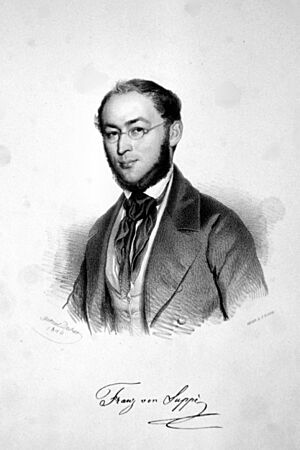Franz von Suppé facts for kids
Franz von Suppé (born Francesco Ezechiele Ermenegildo de Suppé; April 18, 1819 – May 21, 1895) was an Austrian composer. He was famous for writing light operas, called operettas, and other music for the theater. Suppé came from a region called Dalmatia, which is now part of Croatia. He was a composer and conductor during the Romantic period of music.
Suppé wrote about 48 operettas. Some of his works are still performed today, especially in German-speaking countries. He also composed a lot of church music. However, he is best known for his exciting overtures. These are pieces of music played at the beginning of an opera or show. His most famous overtures include Poet and Peasant, Light Cavalry, Morning, Noon, and Night in Vienna, and Pique Dame.
Contents
Life and Music Career
Early Life and Education
Franz von Suppé was born on April 18, 1819, in Spalato. This city is now called Split in Croatia. His full name was Francesco Ezechiele Ermenegildo de Suppé. His father and grandfather were civil servants for the Austrian Empire. Suppé's mother was from Vienna.
He spent his childhood in Zara, now called Zadar. There, he started learning music and composing at a young age. A local bandmaster and the choirmaster at the Zara cathedral encouraged his musical talent. As a teenager, Suppé studied the flute and music theory. Some stories say his father wanted him to be a lawyer. He supposedly studied in Padua and met famous composers like Rossini and Verdi.
In 1835, Suppé's father passed away. His family then moved to Vienna. In Vienna, Suppé continued to study music with Ignaz von Seyfried. Seyfried was a student of the famous composer Mozart. Suppé played the flute in orchestras and taught Italian. Italian was his first language.
Starting His Career
From 1840, Suppé worked as a composer and conductor. He worked for Franz Pokorny, who managed several theaters in Vienna and other cities. On November 24, 1860, a very important event happened. Suppé's operetta, Das Pensionat (The Boarding School), was performed in Vienna. Many people consider this the start of the true Viennese operetta.
Das Pensionat was very popular. It was played for 20 nights in a row and 34 times in total. It was the first operetta written with an original German story. It was also the first Viennese operetta to be performed outside of Austria. It was even played in New York in 1861. Suppé was greatly influenced by the French composer Jacques Offenbach. He studied Offenbach's works and used them as a guide for his own successful operettas.
Famous Operettas
Suppé's most popular one-act operetta is Die schöne Galathée (The Beautiful Galatea), from 1865. This work was inspired by Offenbach's La belle Hélène. Die schöne Galathée is still performed often in German-speaking countries. It has also been played in New York and London.
For a while, Suppé did not have a big full-length opera success. But after Johann Strauss's Die Fledermaus became a huge hit in 1874, Suppé caught up. His operetta Fatinitza (1876) was a great success. It was popular in Vienna, London, and Paris.
In 1879, Suppé had an even bigger hit with Boccaccio. His last lasting success was Donna Juanita in 1880. After Donna Juanita, many of his works were popular for a time, but they are not as well-known today.
Suppé wrote music for over a hundred shows. These included performances at the Theater in der Josefstadt, the Carltheater, and the Theater an der Wien. He also worked on important opera productions. For example, he was involved in the 1846 show of Meyerbeer's Les Huguenots with the famous singer Jenny Lind.
Later Life and Death
Suppé was married twice. First, to Therese Merville, and after she died in 1865, to Sofie Strasser. He passed away in Vienna on May 21, 1895, at the age of 76.
Suppé's Musical Works
Suppé composed about 30 operettas and 180 other stage works. These included farces and ballets. While many of his operettas are not well-known today, some of his overtures remain very popular. His famous operettas include Boccaccio, Die schöne Galathée, and Fatinitza. One of his songs, "O du mein Österreich" (Oh, you my Austria), is considered Austria's second national song.
Suppé kept in touch with his home region of Dalmatia. He sometimes visited Split, Zadar, and Šibenik. Some of his works are connected to this area. For example, his operetta Des Matrosen Heimkehr takes place in Hvar.
After he stopped conducting, Suppé continued to write for the stage. But he became more interested in writing sacred music, which is music for religious purposes. He wrote a Requiem Mass in 1855. A Requiem is a special mass for the dead. He also composed an oratorio, three masses, and other pieces. His Requiem Mass shows his admiration for Mozart's Requiem.
A music expert named Robert Letellier said that Suppé was a master of three music styles. These were the Italian (like opera buffa), the French (like opéra-comique), and the German styles. Letellier noted that Suppé's overtures were a major part of his operas. Some of them became extremely popular. Poet and Peasant and Light Cavalry are among the most famous overtures ever written. Other great overtures include those for Morning, Noon, and Night in Vienna, Pique Dame, Flotte Bursche, and Banditenstreiche.
About His Surname
Most sources spell Suppé's name with an acute accent (Suppé). However, sometimes it is spelled with a grave accent (Suppè). This is because Suppé himself sometimes signed his name with a grave accent. But his name is written with the acute accent on his tombstone. In his baptism records, it was written without any accent at all.
See also
 In Spanish: Franz von Suppé para niños
In Spanish: Franz von Suppé para niños
Images for kids
 | Tommie Smith |
 | Simone Manuel |
 | Shani Davis |
 | Simone Biles |
 | Alice Coachman |




